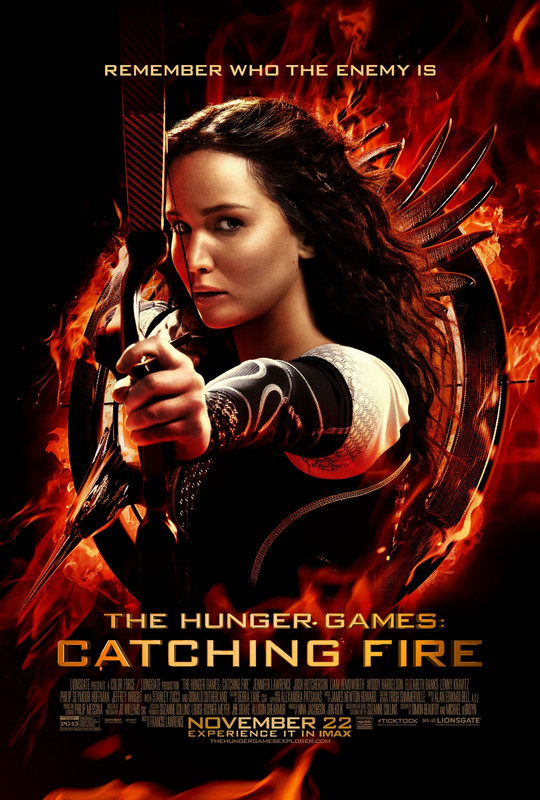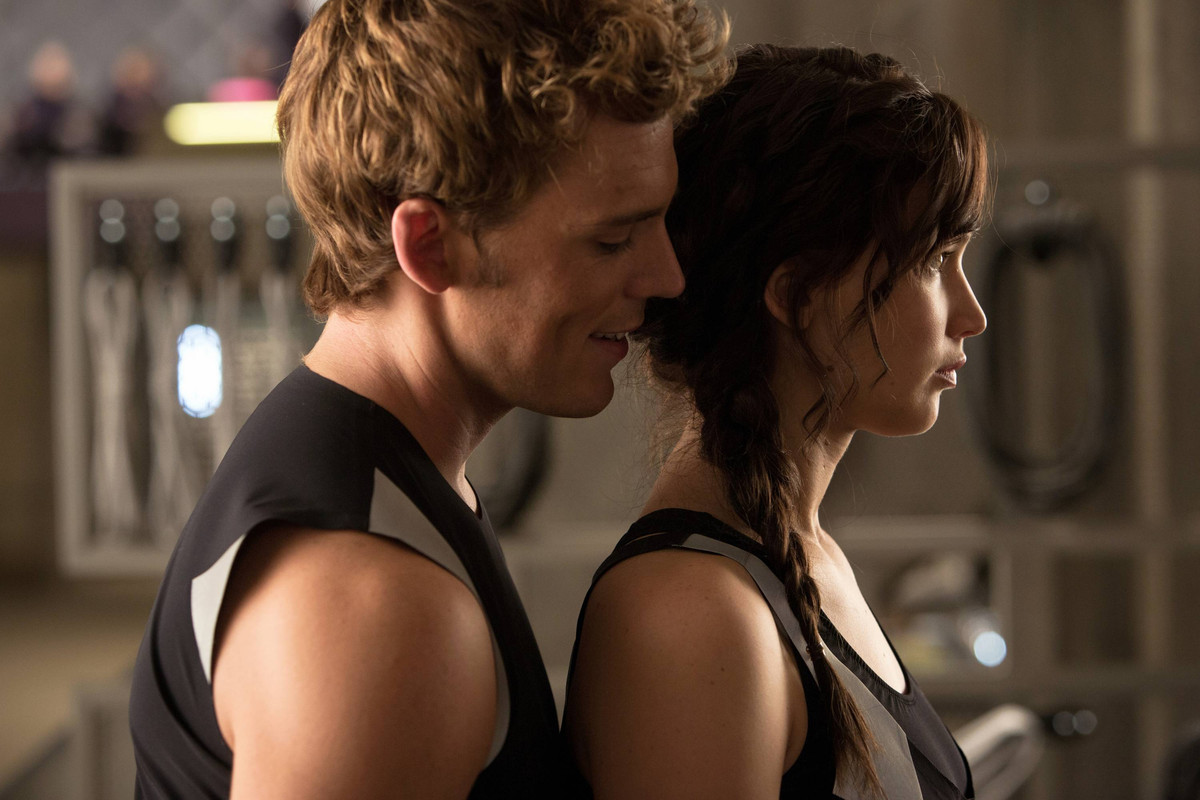Dir: Francis Lawrence
When I walked in to see the first Hunger Games film in 2012 I had little idea what to expect. What I found was a tonally unbalanced mess; Battle Royale via Twilight with a side order of dictatorial dystopia, styled by Monty Python on acid. In short, I didn't like it. I wasn't planning to see this second installment in the series (which, no doubt inspired by Harry Potter and Twilight, is splitting the adaptation of its third and final source novel into two films), but I was at a loose end, it was still showing, and every review I'd seen of the film had deemed it better than the original.
Catching Fire picks up the story of Katniss (Jennifer Lawrence) and Peeta (Josh Hutcherson) a few weeks after their victory in the 74th Hunger Games. As is traditional they are being sent on a winner's tour of the 12 districts of Pan-Em as a propaganda tool for the Capitol and President Snow (Donald Sutherland). The way that Katniss and Peeta subverted the intention of the games has led to incipient rebellion in some districts and to quell this rebellion new gamemaker Plutarch Heavensbee (Philip Seymour Hoffman) suggests that the 75th Hunger Games set former winners against each other, leading to Katniss and Peeta being back in the fray. Alongside this, Katniss and Peeta must pretend to be in a relationship, while she is still in love with Gale (Liam Hemsworth).
As you can probably tell from the above paragraph, there is a lot to get through in Catching Fire, unfortunately the film (and I should stress at this point that I've not read the book) shunts many of its most interesting ideas off to the side and ends up dwelling, for much of its running time, on the preparation for and events of the games themselves. The stakes have risen, but much of the film feels like a rerun of what was already overlong and reasonably dull in the first film. It also, joy of joys, gives us ample opportunity to revisit Stanley Tucci's supremely annoying performance and catastrophic hairstyle.
The disappointment is that, to my surprise, the film is pretty effective in its first 40 minutes or so, before we get back to the drudgery of the games. The dystopia in which the series is set was presented largely through the games in the first film, but here we see a little more of the districts and peek further behind the machinations of the Capitol. The way that Katniss and Peeta are being used, the implied threats to them and their families and the glimpses of the crackdown the Capitol is enforcing on even the smallest acts of rebellion manage to give this film a much more serious and darker tone, at least until Elizabeth Banks waltzes on as Effie to remind us how ludicrous the rest of the film looks and undermine the seriousness that is otherwise being established.
Assisting the film in grounding its first act are solid performances from Jennifer Lawrence and Josh Hutcherson. Both are especially good in the scenes in which they have to pretend to be in love, playing the different ways their characters are hurt by this. Sadly this is another area in which the film manages to undermine itself, robbing Katniss' side of the love triangle of much of its power by still neglecting to develop its third point, Liam Hemsworth's Gale, as a character. However, Lawrence and Hutcherson play well off each other and their relationship gives the film much of its drive.
Also contributing solid work are some of the other 'tributes' that Katniss and Peeta must face during the games. Most memorable are Jeffery Wright, as a tribute who uses his scientific knowledge to survive and Jena Malone, who steals several scenes, notably her first, as the ballsy, bitchy Johanna Mason. Of course, there are bum notes hit in the performances; Sam Claflin remains as bland a presence as ever, Woody Harrelson sticks to drunk performance 101 and the less said about Stanley Tucci and Elizabeth Banks' irritating camp the better.
Once the film segues into the games and what surrounds them it largely loses its way. It's tough to talk about why this is, because where I would like the focus to be is on the build up to the film's big twist, to see how that is being worked behind the scenes, given the Police state it's happening in, with the games in the background as motivating, rather than driving, force. This might also, to some degree, get around the problem with the twist, which is that when you sit back and consider all the variables that have to work at the exact right moments for it to be viable you realise how absurd it is, and the story collapses like a house of cards.
Stepping away from the games might also have allowed more time to give Gale some weight as a character and make the love triangle more engaging, it might have allowed us to get further into what's happening in the districts and how President Snow's plan to change the perception of Katniss is working. In short, it would allow some real world building, which the first act begins to do, but never gets far enough with, rather than a rehash of something we've already seen.
Francis Lawrence (who made the reasonable Constantine and the rubbish I Am Legend) is better suited to this material than the first film's director Gary Ross. The best instinct Lawrence has is immediately evident, while the first film was a shakycammed mess this one has a much steadier visual style, which leads me to suspect that the moments the action degenerates into nonsense are a result of rating concerns rather than poor filmmaking per-se. Unfortunately for the film Lawrence does engage in one of the most irritating traits of big budget filmmaking right now; the teal and orange (in this case mostly teal) look. Barring some of the scenes in the Capitol and the greens that the jungle setting for the games introduces, almost every frame of this film is dominated by a steel blue tint and highlighted with bright yellow or orange. In some scenes characters are watching footage from elsewhere in Pan-Em, so you'll have teal and orange within teal and orange. It is incredibly boring to look at.
The Hunger Games left me with little hope for its sequel and while this is a better film, and promises better things for the next two installments, it is a film beset with problems that have easy remedies. It's a frustrating watch because somewhere here there's an interesting, thrilling, intelligent film, but only hints of it have made it to the screen.
★★
★★



No comments:
Post a Comment